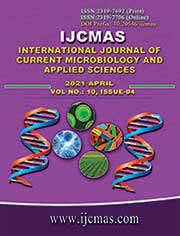


 National Academy of Agricultural Sciences (NAAS)
National Academy of Agricultural Sciences (NAAS)

|
PRINT ISSN : 2319-7692
Online ISSN : 2319-7706 Issues : 12 per year Publisher : Excellent Publishers Email : editorijcmas@gmail.com / submit@ijcmas.com Editor-in-chief: Dr.M.Prakash Index Copernicus ICV 2018: 95.39 NAAS RATING 2020: 5.38 |
Polycyclic aromatic hydrocarbons (PAHs) and total petroleum hydrocarbons (TPHs) in oilfield wastewater are of environmental importance because of its negative impact in the environment where they are discharged. Therefore it is important to efficiently treat oilfield wastewater before its discharge into the environment. This study therefore investigated the capabilities of pure cultures of bacteria in the biodegradation of polycyclic aromatic hydrocarbons (PAHs) and total petroleum hydrocarbons (TPHs) in oilfield wastewater. Standard procedures where observed in the collection of oilfield wastewater samples and its investigations. The bacteria used for the study were isolated from soil enriched with oilfield wastewater. Four bacteria isolates were molecularly identified using 16S rRNA method as Morganella morganii (MN094330), Pseudomonas xiamenensis (MN094331), Chryseobacterium cucumeris (MN094332) and Staphylococcus sp (MN094333). Each biodegradation experimental 250 ml flask contained 125 ml of oilfield wastewater (ofww) and 6.25ml (5%) of the bacteria culture. The control contained only the ofww (125 ml). The set up were placed in a shaker incubator at 28oC with 200 rpm for aeration. The experimental samples were periodically analyzed at day 1, 7 and 21 intervals for PAHs and TPHs using Gas chromatography (GC). The initial total amount of PAHs and TPHs in the oilfield wastewater on day 1 was 101.72992 mg/l and 342.89053 mg/l, respectively. At the end of the experiment (day 21), the treatment with Pseudomonas xiamenensis recorded the least remaining of 22.23959 mg/l of PAHs with 78.1% removal while the control recorded the highest remaining of 75.40663 mg/l of PAHs remaining with 25.9% removal. There was complete absence of Chrysene in the treatments with Pseudomonas xiamenensis, Staphylococcus sp and Chryseobacterium cucumeris. There were reductions in the peaks of the various PAHs on day 21 in all the treatments. The least and highest amount of TPHs remaining on day 21 was observed in the Chryseobacterium cucumeris (58.18741 mg/l) and control (240.74905 mg/l), respectively with percentage removal of 84.8% and 36.9%, respectively. The treatment with Morganella morganii on day 21 showed total clearance of C12, Pr, C22 and C26. After 21 days of treatment, Pseudomonas xiamenensis showed removal of C12, C19, C22 and C26. Staphylococcus sp recorded removal of C12, Pr, C19, C20, C22 and C26. Chryseobacterium cucumeris completely removed C10, C12, Pr, C19, C20, C22, C23 and C26. At the end of the experiment, the ability of the individual bacterium to biodegrade PAHs and TPH were revealed by Gas chromatography (GC). However, some organisms’ biodegraded PAHs faster than TPH and vis versa.
 |
 |
 |
 |
 |